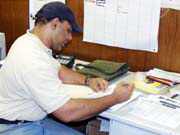Julio Casanova was in serious debt when his father died three years ago. After he took out a loan, his debt got increasingly worse.
Casanova, 43, wanted to keep his father’s home in downtown Jersey City, but did not have the money to pay off the $100,000 debt that his father had accumulated in mortgage fees, tax liens, and funeral expenses, he said. If he did not come up with the money at once, the bank was going to foreclose on the property. Unable to get a loan from an established institution, he was forced to get a high-interest loan from a more obscure lender. That loan would soon become the bane of his existence when he learned the way that he’d be paying a host of hidden fees throughout the life of the loan, he said.
“It’s hidden verbiage,” Casanova said. “They’re your best friends. They encourage you to use their attorneys, use their appraisers, and they prey on low-income minorities.”
He is referring to a practice known in the financial world as “predatory lending.” Such loans are normally given when a person is refinancing his or her mortgage. The financial institution gives the loan with the intention of foreclosing on the property. Historically, minorities are most susceptible to this practice because they often have more difficulty getting loans from established financial institutions.
The practice is not illegal, but often involves hidden costs that can bleed a person dry financially.
Casanova learned about how predatory lending works when he went to the office of the Association of Community Organizations for Reform Now (ACORN), a non-profit organization with a branch on Newark Avenue, recently.
After reviewing the documents he had signed carefully, Casanova learned that thousands of dollars in hidden fees were tagged onto the loan. At a 12.4 percent interest rate, the loan has turned Casanova’s life into a constant state of paranoia, as he fears the day when he is unable to make a payment.
“Right now I’m unemployed, so I’m walking that tightrope hoping my two tenants can pay,” Casanova said. “They should call it financial rape.”
“If people are paying more than nine percent, a red flag goes up,” an ACORN representative said last week. ACORN representatives request not to have their names published in the media. But located on 574 Newark Ave., ACORN helps people in these situations refinance their mortgages through reputable banks that do not attach hidden fees for their services.
As Casanova points out, “the best cure is prevention.” For that reason, ACORN encourages people to come to their offices before seeking a loan so they can receive a basic education and, perhaps, be directed toward companies with a good reputation.
In an effort to reach out to the community, ACORN has scheduled a “Homebuyer Fair” on May 4, at Martin Luther King Jr. School located on 886 Bergen Ave. The event takes place from 10 a.m. to 2 p.m. ACORN representatives intend to educate the public about what banks look for in potential clients and ways of spotting a bad loan. For more information, call (201) 222-0100.
This type of preventive care would have made Jersey City resident Lowell Long’s life much easier over the past decade. In 1988, Long, 67, took out a home equity loan from a company called Abco. But he soon found out that the 25 percent interest he was paying was not on a home equity loan at all. Instead, the company gave him a credit line, allowing them to charge an astronomical interest rate on the $40,000 loan.
“I’ve been paying since ’88 and it’s still $40,000,” Long said last week. “It’s been rough.”
“A lot of times instead of giving them loans, they give them credit lines,” the ACORN representative said. She noted that the practice is not illegal. These lenders are simply deceiving people who need money immediately and are unaware of the pitfalls that are out there, she said.
